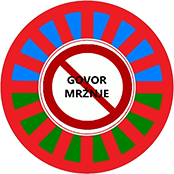What is hate speech?
Hate is never acceptable. You can help stop it.
HATE SPEECH
Hate speech is an increasingly widespread phenomenon, especially online, due to the anonymity offered by many social media platforms to their users. As a result, many scholars and experts started to study hate speech, and tried to find a common definition for it. This attempt, however, was not fully successful until now, because universal definitions are often very general and not helpful in understanding if hate speech is present in a comment or not. For example, it is hard to evaluate hate speech without considering the history, society, and the broader context in which a group exists.
This is why experts preferred to identify three important elements that characterize hate speech: intent, impact, and content.
- Intent: the speaker wants to harm, or act with bad intentions, usually by targeting a group, or an individual as a member of a group, because of some of his/her features including race, ethnicity, religion, gender, sexuality, etc.
- Impact: hate words can cause both physical and emotional harm, physical violence, or damage the victims’ relationship with others, also affecting the victim’s work and personal life. Victims may feel like they do not belong to society, and can pass down these feelings to younger generations.
- Content: scholars are still debating on this element, because some of them believe that anything can be hate speech if said with the intent of inciting hatred. Others, instead, claim that a message must openly promote racial inferiority, stigma, dehumanization, persecution, and violence to constitute hate speech.
The Committee of the Council of Europe defines hate speech as "all forms of expression that spread, encourage, promote or justify racial hatred, xenophobia, anti-Semitism or other forms of hatred based on intolerance, including: intolerance in the form of aggressive nationalism and ethnocentrism, discrimination and aggression towards minorities, refugees and people of immigrant origin."
Although this definition is an attempt to provide guidance, there is no universally accepted definition of hate speech in international legal practice.
When the previously mentioned types of hate speech are presented in an online format (blog, social networks or any other type of online publication), we call it hate speech on the Internet.
Hate speech has existed as long as speech itself. History has recorded numerous examples, which were most often in the function of war and conquest, as well as the exclusion of individuals and social groups from a particular society.
In this context, the most significant forms of hate speech are anti-Semitism and racism.
ANTI-SEMITISM
Anti-Semitism includes any racist and hate-based behaviors directed towards Jewish people. IIn most cases, anti-Semitic behaviours include verbal and physical manifestation of hatred directed towards Jews, together with hostility, prejudice, and discrimination against them. Even though there is a lack of a universal definition, in 2016, the International Holocaust Remembrance Alliance (IHRA) adopted working definition of the phenomenon. For the IHRA, Anti-Semitism is “A certain perception of Jews, which may be expressed as hatred toward Jews. Rhetorical and physical manifestations of antisemitism are directed toward Jewish or non-Jewish individuals and/or their property, toward Jewish community institutions and religious facilities”.
RACISM
Racism is usually described as a discriminatory ideology that believes that some groups or ethnicities are naturally superior to others. Members of these “superior” groups are treated with respect, and their identities and rights are well-recognized and protected. So-called “inferior” ones, instead, are treated as ‘’sub-humans’’, and given their inferiority, they can be discriminated against, oppressed, and deprived of all their rights.
Racism can take different forms depending on the history and geography of specific countries and social groups. This means that, although skin colour has always been the dominant racial marker for discrimination, other markers at the basis of racist attacks can include ethnicity, language, culture, and religion.
In Europe, some groups have been historically more exposed to racism and hatred throughout centuries than others. The most notorious example is hatred against Jewish people, but unfortunately, other groups have been targeted as well, such as the Black people and the Roma people. More recently, racism also targeted religious groups - like Muslims - and foreigners, called xenophobia.
These are working definitions derived by the review of the available literature on these subjects. We accept any kind of support and suggestions from anyone willing to help us craft more fitting, all-encompassing, and precise definitions. With our work, we aim at countering hatred, and we believe that this must be a collective effort: your help is more than welcome!
HATE SPEECH AND FREEDOM OF SPEECH
A controversial aspect of hate speech regulation is its interaction with freedom of speech. Concerns about the potential use of hate speech legislation by states to silence their political opponents explain the importance of a balanced approach to regulation.
According to international conventions, while the right to hold an opinion – however offensive – is absolute, the right to express it is not absolute. Restrictions on freedom of speech should be permitted in exceptional cases, especially where such expressions promote fear, intimidation, harassment and violence. The violations of human dignity contained in some expressions of hate or incitement to violence may go beyond what is generally considered permissible. In such cases, restrictions on speech that visibly promotes intolerance and hatred are considered permissible.
Hate speech - All

